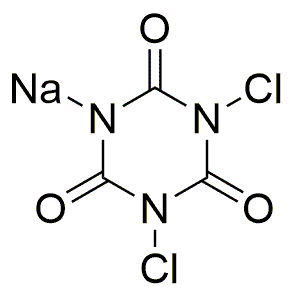Sodium dichloroisocyanurate is widely utilized in research focused on:
- Water Treatment: This compound is commonly used as a disinfectant in swimming pools and drinking water systems. Its ability to release chlorine makes it effective in killing bacteria and viruses, ensuring safe water for recreational and consumption purposes.
- Industrial Cleaning: In various industries, it serves as a powerful cleaning agent. It can effectively remove biofilms and other contaminants from surfaces, making it ideal for food processing and healthcare facilities.
- Textile Industry: Sodium dichloroisocyanurate is employed in the textile industry for bleaching and disinfecting fabrics. Its efficacy in removing stains and pathogens enhances the quality of textile products.
- Laboratory Applications: In research laboratories, it is used as a reagent for various chemical reactions and as a sterilizing agent for laboratory equipment, ensuring a contamination-free environment for experiments.
- Household Products: This compound is found in many household cleaning products, providing an effective solution for disinfecting surfaces and sanitizing areas prone to bacterial growth, such as kitchens and bathrooms.
General Information
Properties
Safety and Regulations
Applications
Sodium dichloroisocyanurate is widely utilized in research focused on:
- Water Treatment: This compound is commonly used as a disinfectant in swimming pools and drinking water systems. Its ability to release chlorine makes it effective in killing bacteria and viruses, ensuring safe water for recreational and consumption purposes.
- Industrial Cleaning: In various industries, it serves as a powerful cleaning agent. It can effectively remove biofilms and other contaminants from surfaces, making it ideal for food processing and healthcare facilities.
- Textile Industry: Sodium dichloroisocyanurate is employed in the textile industry for bleaching and disinfecting fabrics. Its efficacy in removing stains and pathogens enhances the quality of textile products.
- Laboratory Applications: In research laboratories, it is used as a reagent for various chemical reactions and as a sterilizing agent for laboratory equipment, ensuring a contamination-free environment for experiments.
- Household Products: This compound is found in many household cleaning products, providing an effective solution for disinfecting surfaces and sanitizing areas prone to bacterial growth, such as kitchens and bathrooms.
Documents
Safety Data Sheets (SDS)
The SDS provides comprehensive safety information on handling, storage, and disposal of the product.
Product Specification (PS)
The PS provides a comprehensive breakdown of the product’s properties, including chemical composition, physical state, purity, and storage requirements. It also details acceptable quality ranges and the product's intended applications.
Certificates of Analysis (COA)
Search for Certificates of Analysis (COA) by entering the products Lot Number. Lot and Batch Numbers can be found on a product’s label following the words ‘Lot’ or ‘Batch’.
Numéro de catalogue
Numéro de lot/série
Certificates Of Origin (COO)
This COO confirms the country where the product was manufactured, and also details the materials and components used in it and whether it is derived from natural, synthetic, or other specific sources. This certificate may be required for customs, trade, and regulatory compliance.
Numéro de catalogue
Numéro de lot/série
Safety Data Sheets (SDS)
The SDS provides comprehensive safety information on handling, storage, and disposal of the product.
DownloadProduct Specification (PS)
The PS provides a comprehensive breakdown of the product’s properties, including chemical composition, physical state, purity, and storage requirements. It also details acceptable quality ranges and the product's intended applications.
DownloadCertificates of Analysis (COA)
Search for Certificates of Analysis (COA) by entering the products Lot Number. Lot and Batch Numbers can be found on a product’s label following the words ‘Lot’ or ‘Batch’.
Numéro de catalogue
Numéro de lot/série
Certificates Of Origin (COO)
This COO confirms the country where the product was manufactured, and also details the materials and components used in it and whether it is derived from natural, synthetic, or other specific sources. This certificate may be required for customs, trade, and regulatory compliance.


